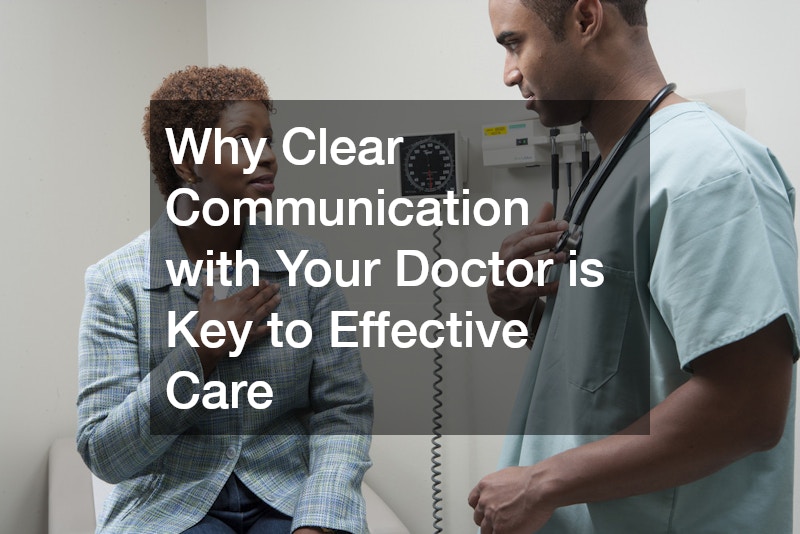
Understanding Your Doctor’s Recommendations for Post-Injury Care
Receiving a medical recommendation from your doctor after an injury is crucial to your recovery and long-term health. However, understanding these recommendations can sometimes be a challenge. Medical advice isn’t always clear, and the process of following through can be overwhelming, especially if you are dealing with a complex injury or treatment plan. Post-injury care is often multifaceted, involving not just physical recovery but mental and emotional support as well. As a patient, understanding the why and how behind your doctor’s advice will help you follow the prescribed treatment and ensure you are on the right track to recovery.
When your doctor provides post-injury care instructions, they typically take into account the severity of your injury, your medical history, and any underlying conditions that might affect your healing. This includes specific instructions on things like medication, physical therapy, wound care, or lifestyle modifications. Often, your doctor will give you a timeline for recovery, but it’s important to be proactive in seeking clarification if you don’t fully understand their advice. Asking questions like, “How long should I rest?” or “What can I do to speed up healing?” can help you gain a better grasp of your treatment plan.
It’s essential that you follow your doctor’s advice to the letter, as any deviation from the prescribed plan may lead to complications or prolonged recovery times. In the case of injuries from accidents, your doctor will also be considering the long-term effects of your recovery, which could involve ongoing care or rehabilitation services. These recommendations often encompass a holistic approach, addressing physical, psychological, and emotional needs to ensure the best possible outcome.
How Medical Adhesive Affects Treatment Plans and Your Doctor’s Advice

Medical adhesives play a pivotal role in the healing process for many injuries and surgical procedures. Whether it’s for wound closure, skin protection, or the use of medical devices, the adhesive material used can significantly impact the treatment plan your doctor provides. Medical adhesives are commonly used in dressings, bandages, surgical tapes, or even devices like catheters or electrodes.
Doctors often opt for medical adhesives because they are less invasive compared to traditional stitches or sutures, making them ideal for treating superficial wounds or post-surgical areas that need to be protected while healing. However, not all adhesives are created equal, and some patients may have allergic reactions to certain materials. Your doctor will take this into account when recommending an adhesive for your injury.
If you experience irritation, redness, or discomfort around an adhesive site, it’s important to communicate this with your doctor. They may suggest switching to a different type of medical adhesive that is more compatible with your skin type or condition. Additionally, the longevity of the adhesive’s bond to the skin will be a factor in your recovery plan. Some adhesives are designed to stay in place for a long time, while others may need to be changed frequently, depending on your injury and the recommended care regimen.
Understanding how your doctor uses medical adhesives in your treatment plan will help you avoid complications. Pay attention to the instructions for caring for wounds or areas that involve adhesive, as improper removal or failure to replace it as directed could impact your recovery.
The Role of Medical Insurance in Getting the Best Medical Advice
In an ideal world, every patient would have access to the best possible medical advice and treatment without financial barriers. Unfortunately, in many countries, medical care can be expensive, and insurance coverage plays a significant role in determining the quality and scope of care you receive.
When dealing with post-injury care, medical insurance helps by covering the costs of doctor visits, hospital stays, surgery, physical therapy, prescription medications, and sometimes even home care services. It can be overwhelming to navigate insurance policies, especially when it comes to knowing what is covered, what isn’t, and how to access the care your doctor recommends.
To ensure you are receiving the best care, it’s essential to work closely with your insurance provider. Ask questions like, “Is physical therapy covered?” or “What specialists can I see under my plan?” These questions will help you understand the limits of your insurance and allow you to make informed decisions about your healthcare options. Additionally, if your injury requires long-term care, it’s crucial to ensure that your insurance policy covers services like home hospice care, outpatient therapy, or any specialized treatments you may need as you recover.
If you feel that your insurance is limiting your access to necessary treatment, don’t hesitate to speak up. Advocate for yourself by requesting second opinions or appealing decisions that you feel may hinder your recovery. Your doctor should be an ally in navigating the insurance system, as they can offer guidance on what services are medically necessary for your recovery.
Why Clear Communication with Your Doctor is Key to Effective Care

Clear communication with your doctor is one of the most important factors in ensuring effective post-injury care. Being an active participant in your treatment plan allows you to make informed decisions about your recovery and avoid misunderstandings that could slow your healing.
When receiving treatment for an injury, your doctor may use medical terminology that is difficult to understand. Don’t be afraid to ask for clarification. Doctors should always explain things in a way that makes sense to their patients. Ask about any technical terms you don’t understand, and ensure that you know what the next steps in your treatment will involve.
It’s also crucial that you openly share any relevant details about your injury and any changes you’ve noticed in your condition. For example, if you’re experiencing unusual pain or if your injury isn’t healing as expected, these are essential pieces of information that could affect your treatment plan. The more honest and transparent you are about your symptoms and concerns, the better your doctor can tailor their recommendations to your specific needs.
If you have questions about the potential side effects of a treatment, alternative options, or even the expected recovery timeline, feel free to ask. Your doctor should be willing to listen and explain their recommendations, giving you the knowledge and tools you need to follow your post-injury care plan effectively.
How to Address Concerns About Residue Analysis in Medical Treatment
Residue analysis in medical treatment refers to the process of detecting substances, often chemicals, residues, or biological materials that may be present in the body following an accident, surgery, or medical treatment. This may include drug testing, traces of foreign substances, or even residue from medical adhesives or dressings used during treatment.
If you have concerns about any residues from treatment, such as medications or surgical materials, it’s important to bring this up with your doctor. Some treatments, like certain adhesives or topical medications, can leave residues on the skin or inside the body, which could potentially affect future treatment or cause allergic reactions. For example, a residue from a bandage adhesive may irritate the skin or cause an allergic reaction, so it’s important to address such concerns early.
Your doctor can perform tests or offer solutions to minimize or eliminate any potential issues with residue. They may recommend different types of bandages, topical creams, or medications that don’t leave harmful residues or suggest alternative treatments that won’t affect your recovery.
Selecting a Local Home Hospice Care Provider and Receiving Expert Advice
For patients recovering from serious injuries, surgery, or chronic illness, home hospice care can provide essential support. Hospice care focuses on comfort and symptom management, particularly for patients with terminal conditions or those needing long-term rehabilitation.
Selecting a local home hospice care provider is an important decision that can significantly affect your quality of life during recovery. Your doctor can offer advice on which providers are reputable and what to look for in a home care service. When choosing a hospice provider, make sure they specialize in your specific needs—whether that’s pain management, wound care, or emotional support. You may also want to consider the provider’s experience in handling the medical adhesive or other specialized care needs you have.
Clear communication with both your doctor and the hospice care team is key to ensuring that the services you receive match your medical needs. If you feel that your recovery requires additional support beyond what’s been provided, don’t hesitate to ask your doctor for recommendations on supplementary services or additional care providers.
Nursing Programs and How They Impact the Care You Receive from Your Doctor

Nursing programs and the role of nurses in your recovery process are often a vital part of the post-injury care experience. Nurses are on the front lines of patient care, assisting with administering treatments, monitoring progress, and providing support and advice to both patients and families.
Many healthcare institutions offer nursing programs that train nurses to specialize in areas like trauma care, post-surgical recovery, or chronic illness management. Your doctor may refer you to specialized nursing programs depending on your injury and recovery needs. These programs can significantly enhance the quality of care you receive, especially if your recovery involves ongoing treatments, wound care, or therapy.
Collaborating with nursing professionals and participating in these programs ensures that you receive personalized care tailored to your unique recovery needs.
Navigating the Medical Office Cleaning Service to Ensure a Safe Environment for Your Care
A clean and sterile medical environment is essential for preventing infections and promoting healing. Medical office cleaning services are responsible for maintaining high standards of hygiene, especially in areas where patients receive care. For individuals recovering from injuries or surgeries, a clean environment is crucial to prevent complications.
You should always inquire about the cleanliness of the medical office and ask your doctor about any concerns related to hygiene, particularly if you’re visiting for regular treatments or follow-up visits. A reputable medical office cleaning service will adhere to strict hygiene protocols to ensure that all surfaces, equipment, and waiting areas are properly sanitized. This helps reduce the risk of infection and ensures that your recovery isn’t hindered by avoidable contamination.
What to Ask Your Doctor When Dealing with Auto Accident Injuries
If your injury is the result of an auto accident, it’s important to ask your doctor specific questions to ensure that you receive appropriate care for both your immediate injuries and any long-term consequences. Ask about the types of diagnostic tests that may be needed, how to manage pain, and whether physical therapy is necessary to regain mobility and strength.
In addition, you should inquire about follow-up appointments and what signs or symptoms to watch out for in the weeks and months following the accident. Understanding the full extent of your injuries and the recovery process will help you stay proactive in your healing journey.
How Medical Building Cleaning Services Can Affect the Quality of Your Care
Medical buildings, from outpatient clinics to large hospitals, require frequent cleaning and sanitation to ensure that patients are receiving care in a safe and hygienic environment. Medical building cleaning services are essential for preventing infections, especially in areas with high patient traffic. Inadequate cleaning practices can introduce harmful bacteria, which could jeopardize your recovery.
For your safety, always ensure that the healthcare facility you visit follows the necessary cleaning protocols. A clean environment can reduce the risk of hospital-acquired infections and ensure that your recovery process isn’t delayed.
Getting the Right Advice After an Auto Accident: What a Car Accident Lawyer Can Do
After an auto accident, obtaining legal advice from a qualified auto accident attorney can significantly impact the outcomes of your recovery process, especially when it comes to handling insurance claims, medical expenses, and potential settlements. A lawyer can help you navigate the legal complexities and advocate on your behalf to ensure you receive compensation for medical bills, lost wages, and other damages.
When to Seek the Advice of a Medical Professional for a Car Accident Injury

It’s important to consult with a medical professional after an auto accident, even if you don’t feel immediate pain. Some injuries, such as whiplash or internal injuries, may not be immediately apparent. A doctor can perform a thorough evaluation and recommend the appropriate course of treatment.
The Importance of Consulting with an Accident Attorney After a Serious Injury
Consulting with an accident attorney is essential if you’ve sustained a serious injury due to an accident. An experienced attorney will help you navigate legal complexities, negotiate with insurance companies, and ensure that you receive fair compensation for your medical expenses, lost income, and other losses related to the injury. The right legal advice can provide the support you need during a challenging time and help you focus on recovery.
Conclusion
Receiving medical advice after an injury is an integral part of your recovery journey, and understanding and following that advice can significantly affect the outcome. Whether it’s dealing with the impact of medical adhesives, navigating medical insurance, or working with a team of specialists, each aspect of your treatment requires clear communication and careful attention to detail. Post-injury care is multifaceted, encompassing not only physical recovery but emotional and mental health support, making it essential to build a good rapport with your healthcare providers.
Ultimately, the success of your recovery depends on a combination of well-coordinated medical treatment, effective communication with your healthcare providers, and the support of various professionals along the way. With a proactive approach to your care and a clear understanding of your doctor’s recommendations, you can ensure that you’re not only on the path to healing but also receiving the best possible advice and treatment for your situation. Whether dealing with a minor injury or a major accident, taking control of your health and seeking the right support will empower you to recover and rebuild your life.
